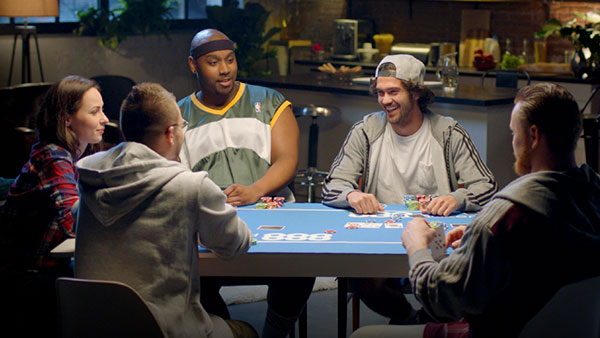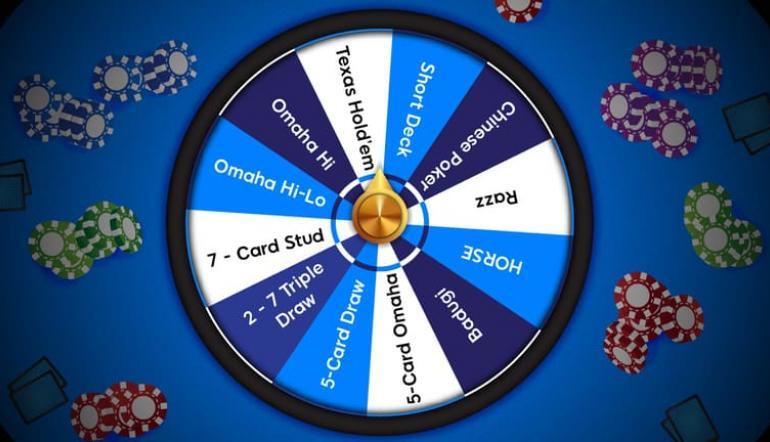The types of Poker games are as varied as the characters who play them. On the surface, you probably know about Texas Hold'em, Omaha Hi-Lo, Omaha Hi, 7 Card Stud, and perhaps even the Irish Poker drinking game.
The types of Poker games are as varied as the characters who play them. On the surface, you probably know about Texas Hold'em, Omaha Hi-Lo, Omaha Hi, 7 Card Stud, and perhaps even the Irish Poker drinking game.
But did you know that each of these games comes in multiple variants? For example, there are pot limit poker games, fixed limit poker games, and no limit poker games. There are SNGs (Sit & Go’s), MTTs (Multi-Table Tournaments), cash games, freerolls, satellites, live tournaments, online poker tournaments, and a smorgasbord of other options available.
In fact, it can get pretty confusing with all the variety that's out there. It's always best to break it down so that you know exactly what types of poker games will best suit your needs:
• Pot Limit – otherwise known as PL, these poker games have a betting structure where a player is able to bet/raise from a minimum amount up to the current size of the pot.
• Fixed Limit – also known as limit poker, the betting structure in fixed limit games is limited. This could be something like 2/8/16/16 indicating that the betting size is fixed at $2 pre-flop, $8 on the Flop, and $16 on the Turn and River.
• No Limit – the abbreviation for no limit is NL, and as its name suggests, there is unlimited betting in NL games.
In essence, you can pick any poker game and play it with any of the above betting structures in online poker games, or live poker games. It's really important to manage your poker bankroll as effectively as possible when you pick a betting structure.
No limit betting structures can destroy your bankroll in double-quick time, so plan your plays with the right poker strategy. A good starting point is a comprehensive poker guide which deals with betting limits (minimums and maximums), poker psychology, and poker rules.
THE DIFFERENCE BETWEEN THE TYPES OF POKER GAMES AT CASINOS?
Casinos offer many standard poker games such as Omaha Hi, Texas Hold’em, High/Low Chicago, 5-Card Draw, and 7 Card Stud, in addition to other exciting variants like Caribbean Stud Poker, Aces and Faces, Deuces and Jokers, and scores of other video poker games.
Let's briefly compare the rules for the 6 types of poker games:
1. Texas Hold’em
2. Omaha
3. 7 Card Stud
4. Irish Poker
5. Caribbean Stud Poker
6. Video poker games
1. TEXAS HOLD’EM
In Texas Hold’em, players are dealt 2 pocket cards, followed by the Flop, Turn, and River. Players can use their 2 cards, or play the board to form the best 5-card hand.
2. OMAHA
In Omaha Poker, players are dealt 4 pocket cards and the player must use only 2 of those hole cards and 3 community cards to form the ranking 5-card hand.
3. 7 CARD STUD
In 7 Card Stud, there is no Flop and there are no community cards either. Each player receives 7 cards during the game, but only the best 5-card poker hand wins the pot
4. IRISH POKER
Irish Poker is a guessing game which combines elements of Texas Hold'em and Omaha. The rules of Irish Poker are exciting, and different to traditional poker games.
5. CARIBBEAN STUD POKER
Caribbean Stud poker is played against the dealer, not against other players. You place an Ante bet to get started. If you want, you can also play a Progressive Bet. Player and dealer are dealt 5 cards. Determine the strength of your hand, and place a bet if you want to proceed. The Royal Flush pays the big-money.
6. VIDEO POKER GAMES
come in many different shapes and sizes, and all of them are played against the computer, not against other players. Typical video poker games like Jacks or Better, Deuces and Jokers, Aces and Faces, Deuces Wild, Tens or Better and the like abound. Be sure to understand the poker rules for each video poker variant before betting.
With video poker games, it's always best to play the maximum number of coins at an online casino, or a land-based casino to get maximum benefit. Remember, a Royal Flush only pays out the maximum when you play all 5 coins. For players who don't understand the specifics, it's possible to play video poker online before you play for real money.
DIFFERENT TYPES OF HOME POKER GAMES
Sometimes you may not be in the mood to visit a land-based poker room, or casino. In this case, you may be tempted to invite your friends over to play home poker games. The most common home poker games include Texas Hold'em, Omaha, Strip Poker, or even Irish Poker.
Home poker games are more personal, so it's really important to contact your guests well ahead of time to ensure that everybody is on the same page.
You can never really go wrong with Texas Hold’em – the King of the Poker Ring, and Omaha is a close second. However, if you're looking for some wild action with a big group of poker fans, you may want to consider games like Strip Poker and Irish Poker. Let's take a look at each of these poker variants:
STRIP POKER
preferably played with a big group of friends who are comfortable with one another. With Strip Poker, your clothing serves as your collateral – your bankroll – in the game. Everybody should start with an equal number of clothing items, and certain items have a higher value than others.
For example, scarves and hats are low-value items, while underwear is considered a high-value item. The player who wins a round of Strip Poker gets to keep their clothing on, while everyone else in the hand has to remove an item of clothing.
IRISH POKER DRINKING GAME
Irish Poker is a lot of fun, and it stems from Texas Hold'em and Omaha, with a twist! The Irish Poker drinking game is where it's at, and this game is really easy to play.
Each player is dealt 4 cards face down, the player left of the dealer begins to guess whether the card on the far left is red or black. If the player's right, 2 drinks are handed out. If the player is wrong, he/she must drink 2 drinks. The action continues around the table. It's worth looking into the rules of Irish Poker if you're interested in this drinking game.
HOW IMPORTANT IS POKER PSYCHOLOGY?
Poker psychology plays a pivotal part in the game. Poker veterans understand that it's not just about playing your cards, it's about playing the players at the table. Poker psychology teaches you to temper your expectations, and play rationally rather than emotionally.
A good understanding of poker rules and poker bankroll management goes a long way towards improving your game. When you've mastered the basics, you can confidently put your poker skills to the test at online poker rooms or live poker tournaments. Anything less, and you'll invariably find yourself repeating this line from Matt Damon in rounders:
‘If you can't spot the sucker in the first half-hour at the table, then you are the sucker.’




















